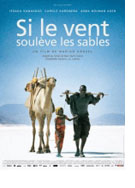

Opening 26 Jul 2007
Directed by:
Marion Hänsel
Writing credits:
Marc Durin-Valois, Marion Hänsel
Principal actors:
Isaka Sawadogo, Carole Karemera, Asma Nouman Aden, Emile Abossolo M'bo, Marco Prince
This ambitious movie by Marion Hänsel, who also wrote the script, should be understood as a parable of the hopelessness of a whole continent. After she read the book Chamelle by French author Marc Durin-Valois, for which he received the “Prix de la Francophonie”, Marion Hänsel was immediately taken by the story of Rahe and his family who have no access to drinking water, a fate he is sharing with millions of people who die due to limited or no access to water. “It could as well be a documentary,” she says. “I had the strong desire to show the suffering of real people behind the impersonal news bulletins. Instead of bland words that don’t touch us any longer and seem to be banal and meaningless, I would like to replace the mere abstractions with a heartfelt empathy.” For this film project she has collected EUR 3.7 million from various financial sources and sponsors, among them ZDF/arte.
Rahe (Issaka Sawadogo) and his wife Mouna (Carole Kremera) live with daughter Shasha (Asma Nouman Aden) and their two sons Ako and Ravil (Said Abdallah Mohamed, Ahmed Ibrahim Mohamed) in a small village somewhere in Africa. Every year the desert is spreading further, drying out wells and forcing people to leave their homes in search of water. Rahe has no choice but to leave and take his family on an arduous track to try his luck. A journey through flat, dry land and inhospitable, stony landscape follows. Whenever they arrive at a well, whole clans with their herds are already there, pushing and fighting for a canister of water. The military are in control, ready to make a deal with anyone able to pay. It is a frustrating situation. The little family with their meagre herd of goats and one camel is driven on. But even in these barren, hostile surroundings they have to fear for their lives; trigger-happy rebels attack them. It is heartbreaking to see Rahe’s eldest son driven off by rebels in exchange for the family’s safety. Suffering from heat and exhaustion they move on, always in the hope of finding water. More hardship follows: drunken, marauding bandits block the way and senselessly shoot the youngest son. Devastated and exhausted they stumble on and on. The ending of the film does not offer a solution – only a temporary relief.
Despite the touching story, I felt irritated in more than once instance by the clean and immaculate clothing draped around the characters – after marching for days in the heat – giving it a “staged” feeling, which was very distracting. I am aware of the film’s aim and the bigger issues regarding a shortage and/or squandering of water resources. Living in a cultivated area of Northern Europe, where clean water is easily available by switching on a tap, one looks on helplessly when whole villages are forced to leave their home country to become refugees because their well has dried out. (Birgit Schrumpf)